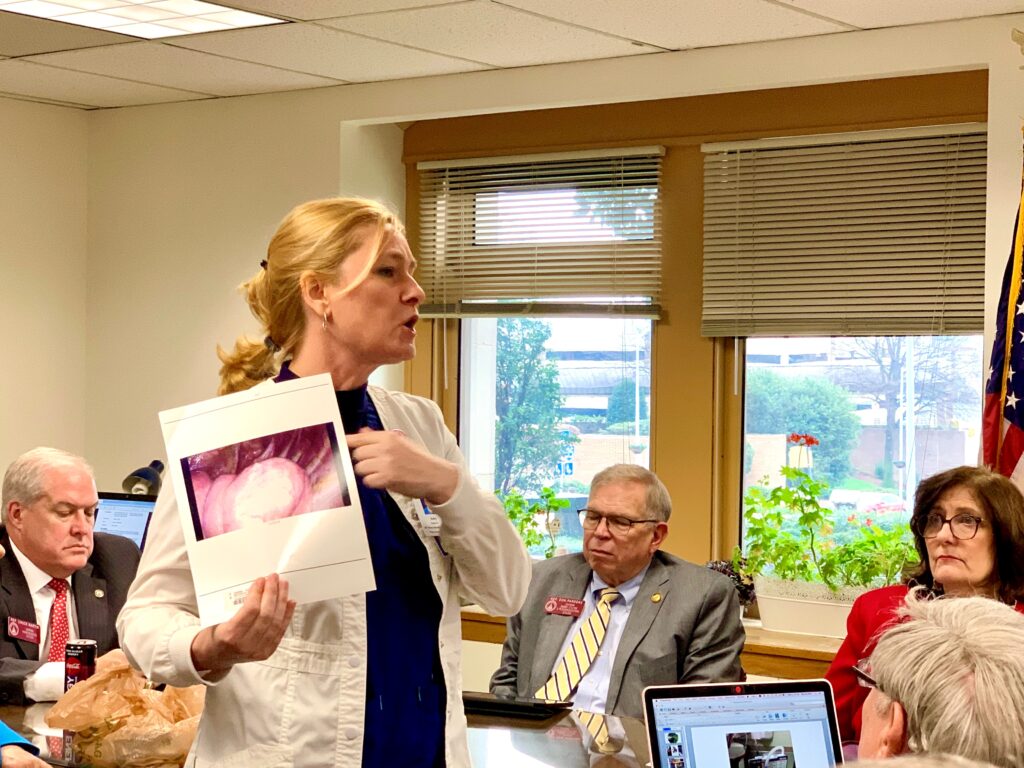
ATLANTA – Vaping could face a new tax in Georgia under a House bill state lawmakers began considering Wednesday.
Several legislators have targeted vaping amid studies showing a growing number of teenagers becoming addicted to nicotine and reports of dozens of vaping-related lung illnesses seen in Georgia by the state Department of Public Health.
U.S. Food and Drug Administration research shows nearly 4 million middle and high school students used vaping products in 2018, a large increase from the prior year.
But vaping proponents have long stressed the activity provides a safer alternative to smoking tobacco that can help addicted smokers kick the habit. Nearly 500,000 people die each year in the U.S. from tobacco-caused diseases, according to the Centers for Disease Control and Prevention.
House Bill 864 would levy a 7% excise tax on sales in Georgia of vaping products like e-cigarettes, refillable cartridges, vape pens and electronic hookahs.
It would also require businesses that make, market or sell vaping products to procure special annual licenses from the state Department of Revenue.
The combined tax revenues and licensing fees would raise an estimated $11.4 million to $17.1 million in the first year the legislation takes effect, according to a fiscal note.
The bill’s sponsor, Rep. Bonnie Rich, said the purpose is to curb vaping use among children. She said she does not want to penalize adults who may use vaping products to curtail tobacco addiction.
“I believe this is the best way to slow down the flow to children,” said Rich, R-Suwanee.
Several supporters who spoke Wednesday urged passage of the legislation to deter health harms traced to vaping and the growing number of teenagers who try vaping products.
Students from the youth council in Sugar Hill told lawmakers they have friends who have become addicted to nicotine through vaping and go through intense withdrawal when trying to quit.
“Some of my friends have tried to stop, but they can’t,” said Avery Tam, a 17-year-old student at North Gwinnett High School. “Once passionate about school or sports or fashion, today they can only think about getting their fix.”
Amy Sedgwick, a nurse at Northside Hospital in Forsyth County, recounted graphic details of her teenaged son’s surgery after his left lung collapsed from heavy vaping use last year. Sedgwick said he had only used vaping products from convenience stores, not any off-market items laced with marijuana.
“No mother should have to watch their 17-year-old being wheeled off to surgery” due to vaping-induced injuries, Sedgwick said.
Meanwhile, several vaping business owners who spoke Wednesday highlighted the economic and health impacts of price increases for vaping products caused by a new tax.
They warned higher costs for vaping could drive longtime smokers back to cigarettes after they’ve made headway weening themselves off tobacco via vaping.
“When you raise the price of this product, people will go back to smoking,” said Keith Gossett, owner of Bucky’s Vape Shop in Columbus.
Others focused on a provision in the bill limiting vaping products to “face-to-face” sales only, which they worry could eliminate online vaping sales that many retailers rely on in Georgia. Cutting out online markets could benefit out-of-state companies not bound by the rules, said David Higginbotham, president of the nonprofit advocacy group Georgia Smoke Free Association.
“What we’re missing here is that while vaping is not safe, per se, it is safer than cigarettes,” Higginbotham said.
A House Ways and Means subcommittee that heard testimony on the bill Wednesday did not vote on whether to send it to the full committee.
Rich’s bill will likely see tweaks to the licensing arrangement and taxing specifics as it moves through the session.
It also figures in handful of other bills that have been filed this session that take aim at colorful advertising techniques and branding for vaping products believed to cater to children.
House Health and Human Services Committee Chairwoman Sharon Cooper, R-Marietta, said last fall that she expects to see legislation this year that would ban flavored vaping liquids in Georgia. That kind of measure has yet to be filed.
